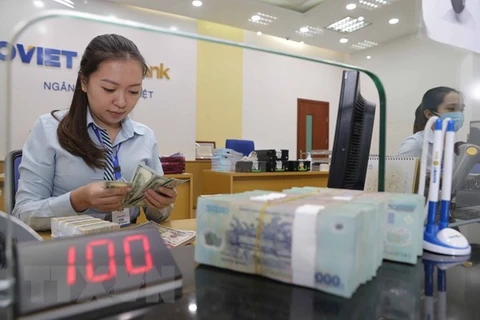Hanoi (VNA) - After strong growth in the previous quarter, Vietnam’s currency bond market contracted 0.2% due to a decline in the Government bond market and slower growth in corporate bonds.
On an annual basis, the market increased 21.1% to 97.4 billion USD.
The information was released in a recent report by the Asian Development Bank (ADB).
The country's Government bonds contracted 2% as the outstanding stock of central bank bills fell 70.3% from the previous quarter. Outstanding government bonds reached 67.3 billion USD. Expansion of corporate bonds moderated to 4.1% from the previous quarter, putting the segment at 30.1 billion USD.
The report said that aggressive monetary tightening in advanced economies has pushed up bond yields and worsened the downturn of financial conditions in emerging East Asia.
Regional currencies fell against the US dollar, equities dropped, and risk premiums widened between August 31 and November 4, according to the latest update of Asia Bond Monitor, released on Sunday today. Portfolio outflows were also seen in most regional bond markets. Global inflation, slower growth in China, and economic fallout from the Russian 'military operation' in Ukraine continued to threaten the region's short-term prospects.
"Financial conditions in emerging East Asia weakened at a faster pace in September and October than in the first eight months of 2022, due to the aggressive tightening by the US Federal Reserve," said ADB Chief Economist Albert Park. "However, the region remains largely resilient so far, despite various headwinds."
Local currency bond issuance in emerging East Asia contracted 1.1% from the previous quarter to 2.2 trillion USD in the third quarter amid subdued investment sentiment. Local currency bonds outstanding grew 2.3% to 22 trillion USD. Emerging East Asia comprises member economies of the Association of Southeast Asian Nations (ASEAN); China; Hong Kong (China); and the Republic of Korea.
Government bond issuance dropped 4.5% from the previous quarter, while corporate bond issuance grew 5.7%, largely supported by Chinese companies taking advantage of domestic monetary easing measures. Rising interest rates drove a 2.0% decline in corporate bond issuance in ASEAN markets.
The sustainable bond market in the ASEAN region plus China; Hong Kong (China); Japan and the RoK grew 1.7% to 521.6 billion USD at the end of September. While the growth was slower than in the previous quarter, the segment witnessed improved market profile and bond types diversification./.
On an annual basis, the market increased 21.1% to 97.4 billion USD.
The information was released in a recent report by the Asian Development Bank (ADB).
The country's Government bonds contracted 2% as the outstanding stock of central bank bills fell 70.3% from the previous quarter. Outstanding government bonds reached 67.3 billion USD. Expansion of corporate bonds moderated to 4.1% from the previous quarter, putting the segment at 30.1 billion USD.
The report said that aggressive monetary tightening in advanced economies has pushed up bond yields and worsened the downturn of financial conditions in emerging East Asia.
Regional currencies fell against the US dollar, equities dropped, and risk premiums widened between August 31 and November 4, according to the latest update of Asia Bond Monitor, released on Sunday today. Portfolio outflows were also seen in most regional bond markets. Global inflation, slower growth in China, and economic fallout from the Russian 'military operation' in Ukraine continued to threaten the region's short-term prospects.
"Financial conditions in emerging East Asia weakened at a faster pace in September and October than in the first eight months of 2022, due to the aggressive tightening by the US Federal Reserve," said ADB Chief Economist Albert Park. "However, the region remains largely resilient so far, despite various headwinds."
Local currency bond issuance in emerging East Asia contracted 1.1% from the previous quarter to 2.2 trillion USD in the third quarter amid subdued investment sentiment. Local currency bonds outstanding grew 2.3% to 22 trillion USD. Emerging East Asia comprises member economies of the Association of Southeast Asian Nations (ASEAN); China; Hong Kong (China); and the Republic of Korea.
Government bond issuance dropped 4.5% from the previous quarter, while corporate bond issuance grew 5.7%, largely supported by Chinese companies taking advantage of domestic monetary easing measures. Rising interest rates drove a 2.0% decline in corporate bond issuance in ASEAN markets.
The sustainable bond market in the ASEAN region plus China; Hong Kong (China); Japan and the RoK grew 1.7% to 521.6 billion USD at the end of September. While the growth was slower than in the previous quarter, the segment witnessed improved market profile and bond types diversification./.
VNA
























